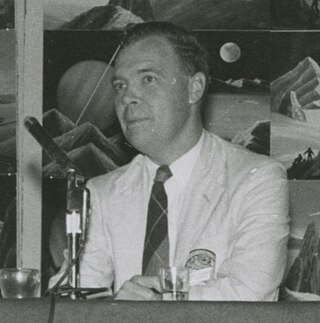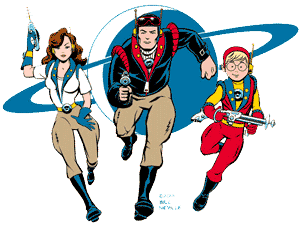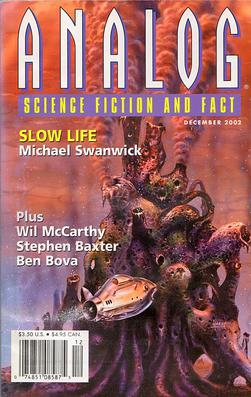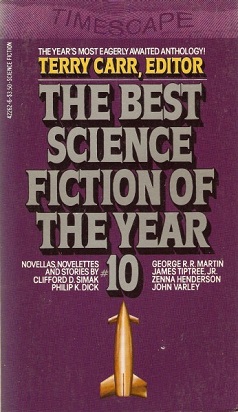Related Research Articles

Harry Clement Stubbs, better known by the pen name Hal Clement, was an American science fiction writer and a leader of the hard science fiction subgenre. He also painted astronomically oriented artworks under the name George Richard.

Patricia Oren Kearney Cadigan is a British-American science fiction author, whose work is most often identified with the cyberpunk movement. Her novels and short stories often explore the relationship between the human mind and technology. Her debut novel, Mindplayers, was nominated for the Philip K. Dick Award in 1988.

Gardner Raymond Dozois was an American science fiction author and editor. He was the founding editor of The Year's Best Science Fiction anthologies (1984–2018) and was editor of Asimov's Science Fiction magazine (1986–2004), garnering multiple Hugo and Locus Awards for those works almost every year. He also won the Nebula Award for Best Short Story twice. He was inducted to the Science Fiction Hall of Fame on June 25, 2011.

Michael Swanwick is an American fantasy and science fiction author who began publishing in the early 1980s.
Gold: The Final Science Fiction Collection is a 1995 collection of stories and essays by American writer Isaac Asimov. The stories, which comprise the volume's first half, are short pieces which had remained uncollected at the time of the author's death. "Cal" describes a robot that wishes to write, and the title story "Gold" expresses both Asimov's admiration of King Lear and his thoughts on cinema adaptations of his own stories. The story "Gold" won a Hugo Award.

Nightfall and Other Stories (1969) is a collection of 20 previously published science fiction short stories by Isaac Asimov. Asimov added a brief introduction to each story, explaining some aspect of the story's history and/or how it came to be written.

The 62nd World Science Fiction Convention (Worldcon), also known as Noreascon 4, was held on 2–6 September 2004 at the Hynes Convention Center, Sheraton Boston Hotel and Boston Marriott Copley Place in Boston, Massachusetts, United States.
The 57th World Science Fiction Convention (Worldcon), also known as Aussiecon Three, was held on 2–6 September 1999 at the Melbourne Convention and Exhibition Centre in Melbourne, Australia.

"Slow Life" is a science fiction novelette by American writer Michael Swanwick, originally published in the December 2002 issue of Analog Science Fiction. It won the Hugo Award for Best Novelette in 2003.
"The Dog Said Bow-Wow" is a science fiction short story by American writer Michael Swanwick, published in 2001. It won the 2002 Hugo Award for Best Short Story and was nominated for the 2002 Nebula Award for Best Short Story. The Dog Said Bow-Wow is the title story of his 2007 short story collection, published by Tachyon Publications, and was reprinted in the same year in Rewired: The Post-Cyberpunk Anthology.
"Fire Watch" is a science fiction novelette by American writer Connie Willis. The story, first published in Isaac Asimov's Science Fiction Magazine in February 1982, involves a time-traveling historian who goes back to the Blitz in London, to participate in the fire lookout at St Paul's Cathedral.

Terry Carr's Best Science Fiction of the Year is an anthology of science fiction short stories edited by Terry Carr, the fourteenth volume in a series of sixteen. It was first published in paperback by Tor Books in July 1985, and in hardcover and trade paperback by Gollancz in October of the same year, under the alternate title Best SF of the Year #14.

The 1986 Annual World's Best SF is an anthology of science fiction short stories edited by Donald A. Wollheim and Arthur W. Saha, the fourteenth volume in a series of nineteen. It was first published in paperback by DAW Books in June 1986, followed by a hardcover edition issued in August of the same year by the same publisher as a selection of the Science Fiction Book Club. For the hardcover edition the original cover art by Vincent Di Fate was replaced by a new cover painting by Ron Walotsky.

The Best Science Fiction of the Year #10 is an anthology of science fiction short stories edited by Terry Carr, the tenth volume in a series of sixteen. It was first published in paperback by Pocket Books in July 1981, and in trade paperback and hardcover and trade paperback by Gollancz in the same year.

The Best Science Fiction of the Year #11 is an anthology of science fiction short stories edited by Terry Carr, the eleventh volume in a series of sixteen. It was first published in paperback by Pocket Books in July 1982, and in hardcover by Gollancz in the same year.
"Rule 18" is a 1938 science fiction novelette by American writer Clifford D. Simak, credited as launching Simak's career and helping inspire the writing style of Isaac Asimov. It won a Retrospective Hugo Award for Best Novelette in 2014.

Ghosts is an anthology of themed fantasy and science fiction short stories on the subject of ghosts edited by Isaac Asimov, Martin H. Greenberg and Charles G. Waugh as the tenth volume in their Isaac Asimov's Magical Worlds of Fantasy series. It was first published in paperback by Signet/New American Library in December 1988. The first British edition was issued in trade paperback by Robinson in October 1989.

Another Round at the Spaceport Bar is an anthology of science fiction club tales edited by George H. Scithers and Darrell Schweitzer. It was first published in paperback by Avon Books in April 1989. The first British edition was issued in paperback by New English Library in January 1992.

Nebula Awards 27 is an anthology of science fiction short works edited by James Morrow, the second of three successive volumes under his editorship. It was first published in hardcover and trade paperback by Harcourt Brace in April 1993.

The Best of Harry Turtledove is a collection of science fiction short stories by American author Harry Turtledove. It was first published in hardcover and ebook by Subterranean Press in April 2021.
References
- ↑ There Is No Escaping . . . Legions in Time!, July 1, 2013